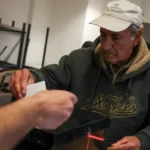
In the midst of its internal with Kicillof and much of Peronism, the former president gave a speech, before a Kirchner auditorium, on the occasion of the anniversary of May 25, 1810 and at the age of 22 years of the assumption of Nestor Kirchner. Without having much charge of anything, he criticized the Government while still recognizing the right -wing agenda. He proposed an Argentina with “new ideas” and attacked public workers, victims of Milei’s chainsaw.
In the “Meeting of Popular Culture”, he dedicated Much of her speech to denounce the Government of Milei and claim her government and that of her husband. Referring to the economic situation, their criticisms were focused on the lack of dollars. He questioned only the high degree of indebtedness, which is not new, and whose subordination to the IMF guidelines has meant a worsening of the living conditions of the workers and poverty from the Macri government and its last government as vice president. Nor did he realize that, when questioning Milei’s cultural battle against the fact that “the AFIP put someone in this country for not having paid taxes,” he was including his three governments on the same list. Similarly, the tail was stepped on the “fragrant contradiction” when the government says “that they free you from the oppressor yoke of the collecting body that pursues you and if it were so terrible there could be 50% of informal economy?”, Affairs that, in fact, refers to the fact that the precarious or without rights was a characteristic feature of the Kirchner governments. Or by pointing out the decrease in consumption as if the government of Alberto Fernández had not been characterized by a poverty of 40 % of the population and the bulk of workers in the poor category. That is to say, From a critic of CFK, which did not leave the frames of neoliberalism, the common denominators that determine, more or less houses, the economic direction of a government with respect to the popular majorities could be seen.
Even more when He recognized the current government that “in some things they pivot on realities”, identifying the “chainsaw” as “a liar but effective construction.” Effective as long as the “chainsaw” identified with hate and anger against the state worker, health and teacher, When “the guy who went to an office to look for a solution, a procedure, and boludo for 20 hours, 30 employees, nobody solved anything, and fucking; the one who went to the public hospital to ask for a turn, or did not give him the turn or offered him for three months; the one who cannot pay the quota to the private school to the son and sends him to the public and as he sends it to the public. The teacher is missing ”… in a wink to the adjustment and discriminating discourse of the government towards pubic workers, the most punished, identified the definition of achieving an“ efficient state ”. It is not the first time that Cristina Kirchner blames public workers. In the case of teachers, for example, he never does about the educational budget of governments, which condemn school deterioration from the lack of schools to very low wages, in the same way as in the public hospital. Meanwhile, they are health workers who put the body for their functioning as well as possible; 12, 24 and up to 72 hours with poor salaries.
Self -criticism was aimed at a rethinking of its “national bourgeoisie” protection model, applied during their government and referred to the great entrepreneurs. “It did not result in an added value investment, for more technological innovation but for profitability”, which according to statistical data was up to 400%. That is, he repeated, in other words, that During his government the great entrepreneurs “took her in Pala”. Now the “novelty” would be to bet on foreign investment, the same battle knight of the Government of Macri and the current one, but that was not the story of the government that called himself national and popular. Although it was a reality. As the former president said: “I say it since it has been the government that had much more direct foreign investment than the neoliberal governments that followed us, called it to discuss it” without prejudices or false historical or cultural clichés. “In the book of Esteban Mercatante, The Argentine economy in his labyrinth. What they leave twelve years of Kirchnerism It can be verified, based on statistical studies, the high level of foreign participation in the economy, in 65% of companies, and how the monopolistic concentration initiated in the ’90s was consolidated, under the “stateistist illusion”, a chapter dedicated to the subject. In the same way, It is verified that the K growth cycle was created on the shoulders of the “bourgeois conquests” of the ’90s, such as labor precariousness and enormous salary fragmentation of the labor movement. In short, This is the signifier of homeland that Cristina Kirchner defends.
His proposal was to close ranks around “new ideas” to end the “discussion of egos and meanness and lack of ideas”, openly referring to the internal that he maintains with Kicillof and much of Peronismin which speech through, The differences continue to be unknown to each other. He even took note that in the Milei elections he lost votes in popular sectors but also that Peronism does not recover them. Using the “self -criticism”, dialoguing with political and social right, and reproducing many of the common senses that led Milei to the government, he tried, towards the October elections, to go out by an intern totally oblivious to the fights that the working people have been giving to face the chain. Peleas that the working people gave either against military dictatorships, and more recently, against the governments of Menem, Rua, and so on until today, when retirees are repressed for demanding decent income to eat and buy the remedies. Of that “homeland” is the one who does not speak or puts the body Cristina.
It is the homeland of popular workers and sectors, opposite to those of the capitalists and the parties that govern according to their interests, which is proposed. It is the only way through which historically the conquests have been achieved or defended. But also Faced with the crisis of representation of the regime and its parties, the perspective of a democracy of those below appears on the horizon: a government of who guarantees with their work daily the necessary production and services, as seen during the pandemic. Measures such as the revocability of officials or that win a salary equal to that of a teacher, the recovery of the unions from the union bureaucracy and all social and student organizations until the Economic planning of the country, decided by working majorities directly and designed to their benefit: it is these discussions that are raised, and not if a handful of large companies and the IMF will continue to live at the expense of our lives.
Source: www.laizquierdadiario.com

